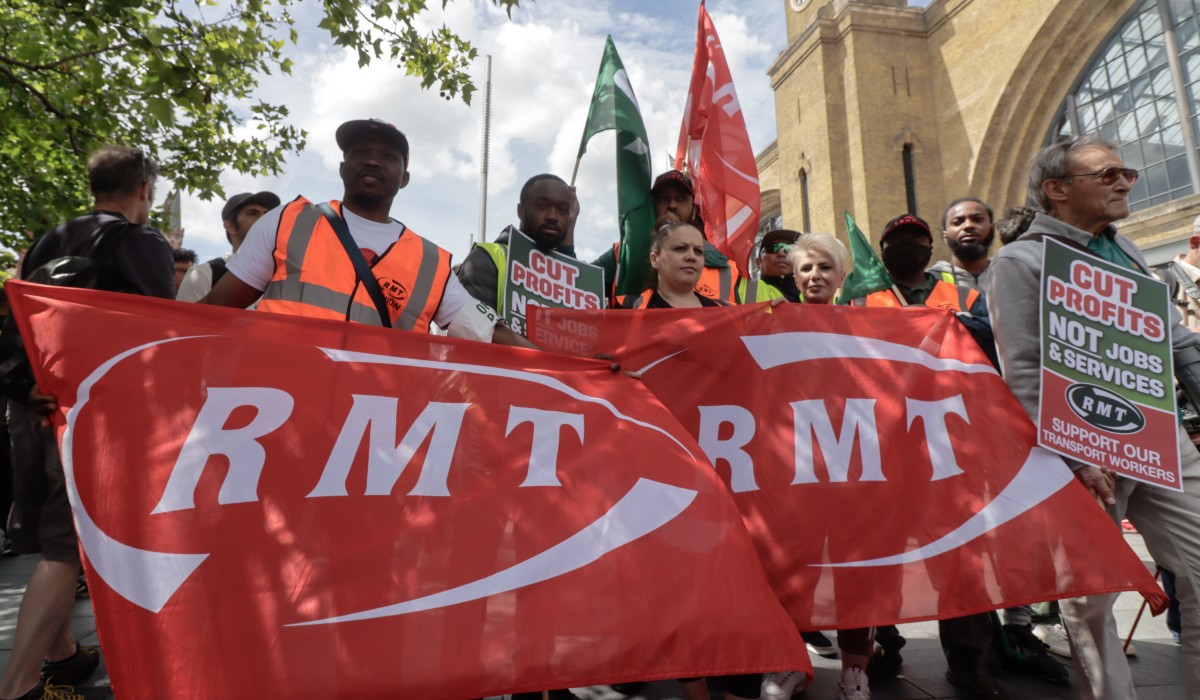 RMT members striking. Photo: Steve Eason / CC BY-NC 2.0
RMT members striking. Photo: Steve Eason / CC BY-NC 2.0
Counterfire’s weekly digest with the latest on strikes and workplace struggles
You can sign up to receive News from the Frontline straight in your inbox
RMT members across London Underground are being re-balloted as the confrontation between themselves and the Mayor of London rumbles on. Sadiq Khan, haplessly committed to transmitting Tory cuts on the London transport system as he is, is trying to cut 600 jobs and slash pensions by 30%. The mayor continues to blame the government and the Covid-19 pandemic, without proposing any way forward that is not simply cuts.
RMT leader Mick Lynch said: “The mayor is under pressure from central government, but he must join us in resisting them and refuse to allow ideologically motivated financial constraints to be used as an excuse to attack Tube workers”. This is true up to a point, but since Khan has had seven years in City Hall to confront the Tories over the absurd lack of central government support for Transport for London, there is little reason to believe he will start now or ever.
Tube workers should tell Khan and the TfL that he should either join a conflict with the Tories, or get out of the way.
FE: mapping the next steps
“There is now likely to be a battle within the union over the shape of the formal ballot and any future action. Left representatives on the FEC are right to argue that as many branches as possible should be included in the formal ballot and that this inclusion should be automatic…”
Don’t miss Tom Whittaker latest analysis.
Rail workers spring back
The rail strikes ending on National Rail has not, despite management predictions, ended the struggle in the train operating companies. Station staff and train crew in both RMT and Aslef have announced dates in May leading into June. Union negotiators cited the continued very low pay offers – still only 5% despite inflation persisting at more than double that figure – and further insistent on worsening workers’ terms and conditions.
The strikes coincide with some notable events, including FA Cup final and the Eurovision Song Contest. In a frankly absurd move, the Tories have accused the unions of “not showing solidarity with Ukraine”, as if a kitschy pop concert has any bearing on anything going on in the rest of the world. Unfortunately, the Aslef leadership have taken the bait, and issued a series of very silly statements trying to argue their pro-Ukraine credentials on Twitter, as opposed to just telling them not to be daft.
This may be a minor thing in itself, but it does show that echoing a Tory government’s talking points paints unions into a corner politically.
North Lanarkshire nursery workers stand up to pay cut and fire-and-rehire
Nursery workers in Scotland have been protesting a £6,000 pay cut imposed by North Lanarkshire Council. May Day demonstrations have been taking place outside Motherwell Civic Centre, with early years workers delivering a 5,000-signature petition to demand the council pulls back on the proposals. Up to 300 people face fire-and-rehire measures, with the local authority attempting to bump staff down two pay grades.
Unison’s branch secretary, Marie Quigley (speaking to Press Association), said, “This is a result of cuts for local government funding from Holyrood.” North Lanarkshire council is hoping to reduce a £3 million gap in their budget. Talks between the union and the council are ongoing. 91% of workers consulted by Unison said they would back strike action.
Local government and school support staff ‘Rise up to get pay up’
From 23 May to 4 July, 370,000 local government and school staff will be balloted for strike action. These include care workers, refuse collectors, social workers, teaching assistants, community workers and street cleaners.
After many years of real-terms pay cuts, these workers have lost on average 25% from the value of their pay over the course of 12 years. Unison negotiators have made a pay claim of inflation+2% at 12.7%, but workers have only been offered a flat rate of a mere £1,925.
A successful ballot would give a strong mandate that these important workers are worth more.
Quality Care Commission – 1,100+ strike “Because we Care”
700 members of Unison and 300 Unite members joined PCS union members on the picket lines at the Quality Care Commission (QCC) this week. The PCS members struck on Tuesday and Wednesday as part of their union’s national pay campaign, which saw 133,000 PCS members strike across 130 government departments. Their Unison and Unite colleagues in the QCC joined them on Tuesday.
Quality Care Commission staff are responsible for inspecting and regulating standards of care across the health and social care sector. They try to protect and maintain safe standards in hospitals, care homes, GP practices and dentists, among others.
A pretty essential service, you might think. The government doesn’t agree. It thinks a pay rise between 2.75-3.5% is more than enough, despite inflation being in double figures, and has refused to allow the QCC to negotiate with the unions. It is this stiff-necked attitude that led union members at the QCC to vote by 93% to work to rule – refusing to work more than the hours they are paid for, and insisting on taking the breaks they are entitled to – since last month, and voted by 73% in favour of the strike action this week.
It is excellent to see different trades unions striking together, but one- and two- day strikes are unlikely to shift this government. What is needed is leadership on the ground that can develop a strategy that will overcome the the leaderships’ reluctance to take the necessary action. One very good reason for reps and activists in the QCC to attend the “How we Fight, How we Win” rank and file conference on 10 June.

UEA lecturers threaten strike action over job threats
Lecturers at the University of East Anglia (UEA) have voted to ballot for strike action in protest at the university’s refusal to rule out compulsory redundancies as it struggles to cope with a £30m budget deficit this year.
The university blames its problems on Covid, a failure to meet its student recruitment targets and rising energy costs, and has already achieved £6m of savings through a voluntary redundancy scheme, which has seen 130 staff leave the payroll. The lecturers’ union (the UCU) points out that the university could achieve significant savings (estimated at well over £10m) if it stopped paying 67 ‘senior’ staff members 6-figure salaries.
The university justifies this by claiming it’s governed by market forces, but in management-speak common across industry, claims that the welfare of ‘its people’ is front and foremost in their minds, and compulsory redundancies would only be looked at as a last resort.
The strike ballot proposed by the UCU is motivated by the frustration that UEA’s self-described ‘leadership team’ is refusing to provide what the union regards as essential financial information, but has announced it will be holding consultation meetings with the relevant trades unions on campus – a legal requirement if they are considering compulsory redundancies.
The UCU is confident that the ballot will achieve widespread support. The union’s campaign was further boosted this week, by the news that the UEA Students Union overwhelmingly passed a vote of No Confidence in the university’s senior management team.
Join Revolution! May Day weekender in London
The world is changing fast. From tariffs and trade wars to the continuing genocide in Gaza to Starmer’s austerity 2.0.
Revolution! on Saturday 3 – Sunday 4 May brings together leading activists and authors to discuss the key questions of the moment and chart a strategy for the left.

